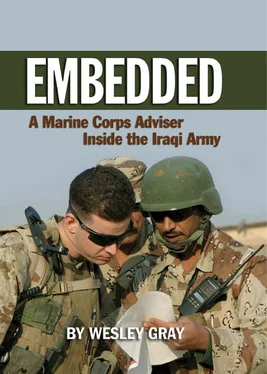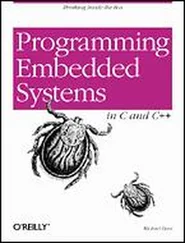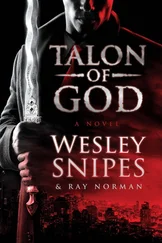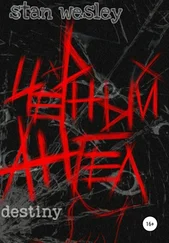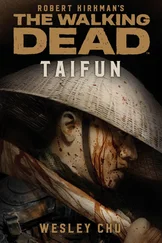My heart was racing for Doc. That poor bastard was out there trying to explain to the Iraqis through an interpreter that it was an accident and that the Iraqi soldiers were sorry for causing the man harm. It seemed as though he was out there for an hour, but in just a few minutes, he returned. “I don’t know if that guy has Allah on his side or what,” Doc said, “but he is alive with some minor lacerations and perhaps a broken rib. He is good to go. I think his fat ass actually saved his life. Let’s get the fuck out of here before we end up on the receiving end of an RPG!” We reformed the convoy and continued north along Route Boardwalk until we reached the WTF a few miles ahead.
As we pulled away from the scene of the crime, I felt terrible for the man and for all the people in the village. Tribal members and family were rushing to the man’s aid. Women were outraged, screaming at the convoy as we left them in our dust trails. It was a disaster. Our situation had been so precarious that we had no option but to leave, and while I felt bad about leaving the man there, our actions kept the insurgents from killing a platoon’s worth of jundi sitting in the back of Leylands. We lost some hearts and minds this go-round. But now was not the time to dwell on this, as we were quickly approaching the WTF.
Establishing a Patrol Base
Recent HUMINT (human intelligence) reports had concluded that the WTF was a base of operations for insurgent activity. We went in expecting the worst but hoping for the best. We approached the main gate to the facility, which was surrounded by a six-foot-high wire fence that had not been serviced since the rule of Saddam Hussein.
The WTF was a small facility the size of two football fields placed side by side. From a tactical military perspective it was perfect as a defendable patrol base. The patrol base had a five-hundred-meter buffer that separated the compound’s fences and the nearest residential areas, multiple exit points that allowed options from which to commence patrols, and a convenient location alongside Route Boardwalk that allowed us to maintain visibility on IED activity at all times.
We established initial security of the compound without incident. As the Marines secured the boundary, the jundi searched all the residential homes and informed the residents that we would be taking over their lives for the next few days. Amazingly, the residents of the facility were friendly to the jundi , inviting them to live in their homes for the course of the operation. I was not sure what to make of this kindness. It might have been old-fashioned Arab hospitality or it might have been the local’s fear of telling a group of sixty-two soldiers toting machine guns “No.”
By the time the jundi had settled into their basic defensive positions it was nearly 2100. We had one problem. In our efforts to ensure that the patrol base was established and the Iraqis were settled, we had forgotten to settle ourselves. “Jamal,” Major Gaines said, “take Doc and find us a place to set up a COC.”
Doc and I stumbled in the dark and tried to find a building that the Iraqis had not yet occupied. We decided to try the generator building in the center of camp. As we entered the building the drumming noise of generators running at full steam and the rusty taste of oil and gasoline in the air greeted us. Doc and I quickly realized that the fact the jundi had avoided the generator building should have been a warning. Nonetheless we wandered through the building in complete darkness. I felt that at any moment an insurgent would jump around the corner and stab me in the neck or blow out my brains. The building was nasty—plain and simple—but it was late and we needed to kick a patrol out early the next morning. The generator building was our only option until we could get a better assessment of the compound the next morning.
We set up shop near the southern entrance of the generator building. We hurried to set up the radios, establish the basic security plan, and figure out the general scheme for the next day. By the time we finished it was 0200 and the first patrol would start at 0600. We decided to go on a staggered two-hour nap schedule split between sleeping, radio watch, and security.
Our nap plan did not last long. As I was half-asleep on the first radio watch of the night, a couple of semifrantic jundi came running up to our position yelling in Arabic, “Jamal, Jamal, as salama aleikum. Shifit erhabeen bil binaye!” (Jamal, Jamal, peace be upon you. I saw insurgents in the building!) I was in a semicomatose state. I answered them in sloppy Arabic, “IHchiet wiya inaqib Mawfood, awwal? Huwwa qaedek, mu anii.” (Did you talk to Captain Mawfood first? He is your leader, not me.) The jundi responded, “IHchiet wiya inaqib Mawfood. Huwwa gillitna lazim niHchi wiyak.” (We did talk with Captain Mawfood. He told us we needed to talk with you.) Great, I thought, the people who are supposed to be taking leadership of the Iraqi army are deferring to me for answers.
“Who’s on your post right now?” I asked the jundi for fear they had abandoned their post. Fulfilling my fears, they responded, “Nobody.” I rushed to wake Martin so he could help me with translation. I could operate without a terp, but when my mind was fried, having a terp made things much smoother and quicker. I told Martin, “Call Mawfood and figure out what the hell is going on. Also, tell these soldiers they need to maintain their post!” Martin reluctantly moved his cream-puff body off his rack, scratched his balls a few times, and fell back on his rack to sleep. I was furious. I shook Martin by the arm. “Get your ass up man—here is the radio—call Mawfood and see what is going on!”
Mawfood made his way over to our area. As he approached our position, he greeted everyone with “As salama aleikum.” We all responded with “Wa aleikum salam” (And upon you, peace). Major Gaines, Captain Mawfood, and I walked to the southeast corner of the compound to listen to the Iraqis who had spotted the insurgents.
“You see that half-built house near Route Boardwalk?” Hussein, the jundi on post, pointed in the direction of a gloomy looking, half-constructed mud hut home 150 meters from their security post. He continued, “We think we saw seven or eight guys walk in there over the past thirty minutes. It looks as if they had shovels and weapons with them.”
It was time to conduct Operation Nimer ’s first combat raid. I started to think back to Infantry Officers’ Course, frantically digging for all the knowledge I had learned on the conduct of raids. It all came back to me as if I had just graduated. I developed a plan to raid the suspected insurgent hideout. I gathered Sergeant Kelley, Corporal Espinosa (“Espi”), and Nuts around the Humvee. With a red penlight in my mouth for lighting, I began to draw a sketch of the building and our plan for the raid. Meanwhile, in the background I heard a faint “As salama aleikum.” I looked up and flipped down my night vision goggles to see who it was. I hoped my mind was playing tricks. It was Lieutenant Jaffer, the same guy who smashed a civilian the day before.
I had heard through Kelley and Espi that Jaffer was the “worst combat leader of all time and a flaming idiot.” Despite Jaffer’s poor track record, however, I stuck to my mission intent as a military adviser and said, “Jaffer, I’d like to hear how you want to go about doing this combat raid. I have a basic plan we can work from, but I’d enjoy hearing your ideas since I am here to advise and not command.”
Jaffer proceeded to give me his basic plan. It sounded more like a poorly thought-out football play than a military operation. Essentially it was “send two guys this way, two guys that way, and then we will go in the front door and search for bad guys.” I was not impressed; neither was I confident this operation would be successful.
Читать дальше
